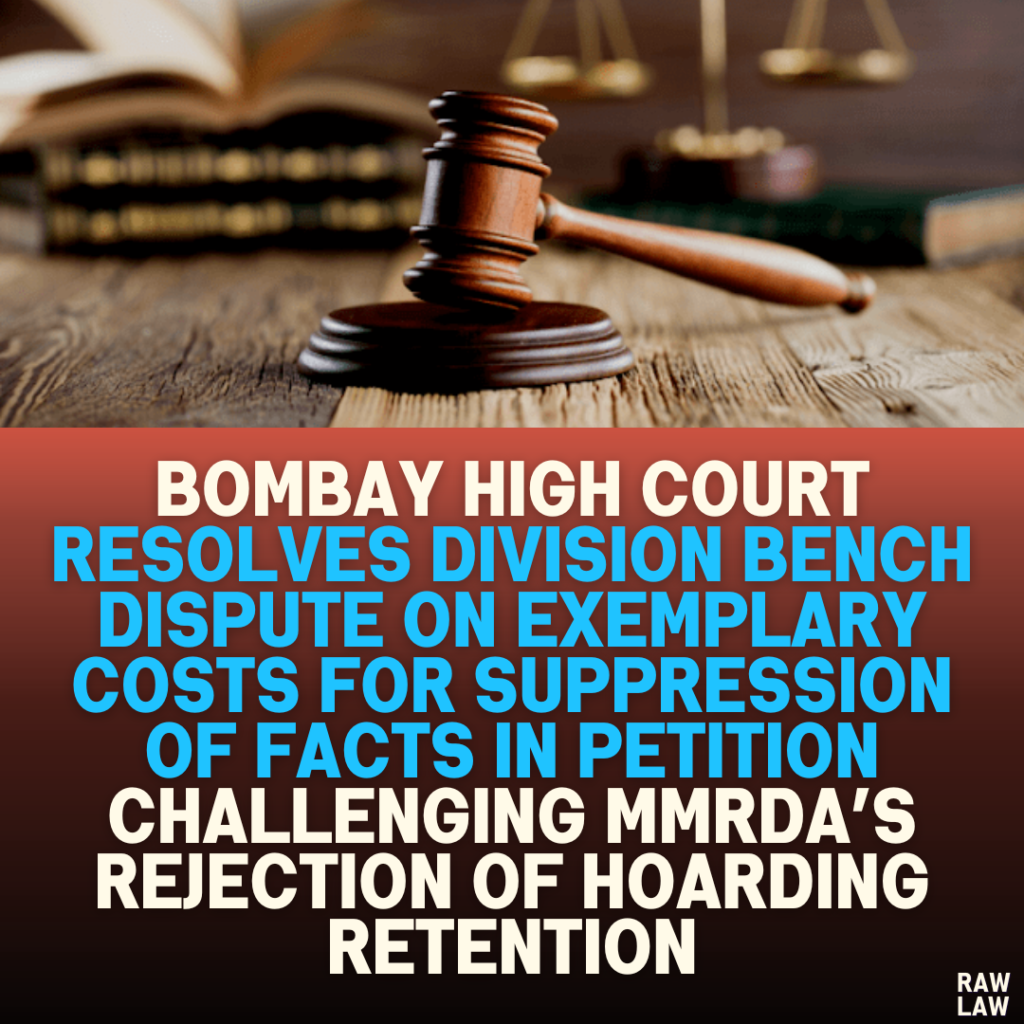Court’s Decision
The Bombay High Court resolved a difference of opinion between Division Bench judges regarding the quantum of exemplary costs to be imposed on the petitioner for suppressing facts and making false statements in a writ petition challenging the Mumbai Metropolitan Region Development Authority (MMRDA)’s rejection of hoarding retention. The Court fixed the exemplary costs at Rs. 5 lakh, overruling a proposal for Rs. 25 lakh, and highlighted the lack of concrete evidence justifying higher costs.
Facts of the Case
- Writ Petition: The petitioner challenged the MMRDA’s July 11, 2024, order rejecting its application for retaining hoardings erected without appropriate permissions. The Division Bench dismissed the writ petition on July 24, 2024, citing statutory violations and suppression of facts.
- Supreme Court Appeal: The petitioner’s subsequent Special Leave Petition (SLP) before the Supreme Court was dismissed on September 13, 2024, confirming the High Court’s decision.
- Dispute on Costs: Division Bench judges agreed on the imposition of exemplary costs but differed on the quantum: one proposed Rs. 5 lakh, considering the petitioner’s false statements; the other suggested Rs. 25 lakh to act as a deterrent.
Issues
- Whether exemplary costs of Rs. 5 lakh or Rs. 25 lakh were appropriate given the petitioner’s conduct and financial gains from erecting unauthorized hoardings.
- Whether sufficient material was available to justify higher costs.
Arguments Presented
- Petitioner’s Arguments:
- Claimed that permissions were sought from a Grampanchayat, albeit not from the MMRDA, due to a misunderstanding, and no fraudulent intent was involved.
- Argued that imposing Rs. 25 lakh as exemplary costs was excessive and lacked legal justification.
- Cited precedents emphasizing restraint in awarding exorbitant costs unless fraud or vexatious litigation was evident.
- Respondent’s Arguments (MMRDA):
- Highlighted that the petitioner erected hoardings without obtaining mandatory permissions from the MMRDA and misled the court with false statements.
- Supported higher costs to deter future statutory violations, noting the petitioner’s substantial commercial gains from the unauthorized hoardings.
Court’s Observations
- Suppression and Misrepresentation: The Court noted that the petitioner had suppressed facts and provided false statements, invoking the court’s equitable jurisdiction under Article 226 to secure interim relief.
- Quantum of Costs:
- Emphasized the need for judicial discretion in awarding costs, aligning with principles of natural justice.
- Highlighted the absence of material evidence, such as financial details of the hoarding erection and advertising profits, to substantiate the Rs. 25 lakh proposal.
- Agreed that Rs. 5 lakh was a reasonable and proportionate amount, serving as both a penalty and a deterrent.
Conclusion
The Bombay High Court fixed exemplary costs at Rs. 5 lakh, as recommended by Justice M. S. Sonak, rejecting the Rs. 25 lakh proposal by Justice Kamal Khata due to insufficient supporting evidence. The decision emphasized the importance of factual substantiation when imposing significant penalties.
Implications
This ruling underscores the importance of judicial discretion in cost imposition, balancing deterrence with fairness. It reinforces the principle that exemplary costs must be supported by clear evidence and should not be arbitrary or excessive. The judgment also highlights the need for adherence to statutory regulations in urban development.




.
Pingback: Jammu & Kashmir High Court Dismisses Plea Against Second Domestic Violence Petition: "Past Co-habitation Sufficient to Establish Domestic Relationship Under DV Act" - Raw Law